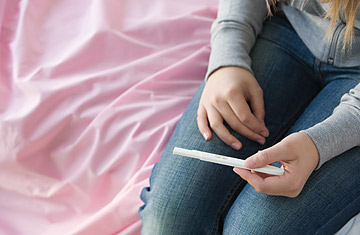
(6 of 14)
It is this naiveté and ineptitude coupled with less openness in American society generally about birth control that, according to Guttmacher researchers, constitute one of the most striking differences between American adolescents and their European peers. In Sweden teenagers are sexually active even earlier than they are in the U.S., and they are exposed to even more explicit television. However, the Swedish National Board of Education has provided curriculum guidelines that ensure that, starting at age seven, every child in the country receives a thorough grounding in reproductive biology and by age ten or twelve has been introduced to the various types of contraceptives. "Teachers are expected to deal with the subject whenever it becomes relevant, irrespective of the subject they are teaching," says Annika Strandell, the board's specialist in sex education. "The idea is to dedramatize and demystify sex so that familiarity will make the child less likely to fall prey to unwanted pregnancy and venereal disease."
In Holland, sex is similarly demystified. While the country has no mandated sex-education program, teens can obtain contraceptive counseling at government-sponsored clinics for a minimal fee. In addition, the Dutch media have played an important role in educating the public, says Dr. Evert Ketting of the Dutch Mental Health Center, citing frequent broadcasts on birth control, abortion and related issues. "We've been told that no Dutch teenager would consider having sex without birth control," says Guttmacher Spokeswoman Jane Murray. "It would be like running a red light."
The signals are quite different for American teenagers. Last summer, when the American College of Obstetricians and Gynecologists unveiled a new public service announcement designed to combat teenage pregnancy, all three major TV networks balked. The reason: the announcement included the word contraceptives. These are the same networks that, as one ABC official put it, routinely depict intercourse to "the point of physical motion under the covers of a bed." Network officials have since relented, but the offending word has been dropped.
How to explain this skittishness? "We are still very much governed by our puritanical heritage," answers Faye Wattleton, president of the New York-based Planned Parenthood Federation. "While European societies have chosen to recognize sexual development as a normal part of human development, we have chosen to repress it. At the same time, we behave as if we're not repressing it." In studying various cultures, the Guttmacher researchers found that the highest teen-pregnancy rates were in countries with the least open attitudes toward sex. "The ambivalence our society is projecting about sex is costing us a lot," concludes Institute President Rosoff.
People who work directly with teenagers agree. "We maintain this incredible double standard with teenagers about sex," says Alice Radosh, coordinator of pregnancy and parenting services in the New York City mayor's office. "If you're swept away by passion, then you didn't do anything wrong. But if you went on a date after taking the Pill or with a diaphragm, then you're bad. You were looking for sex, and that's not permitted."
